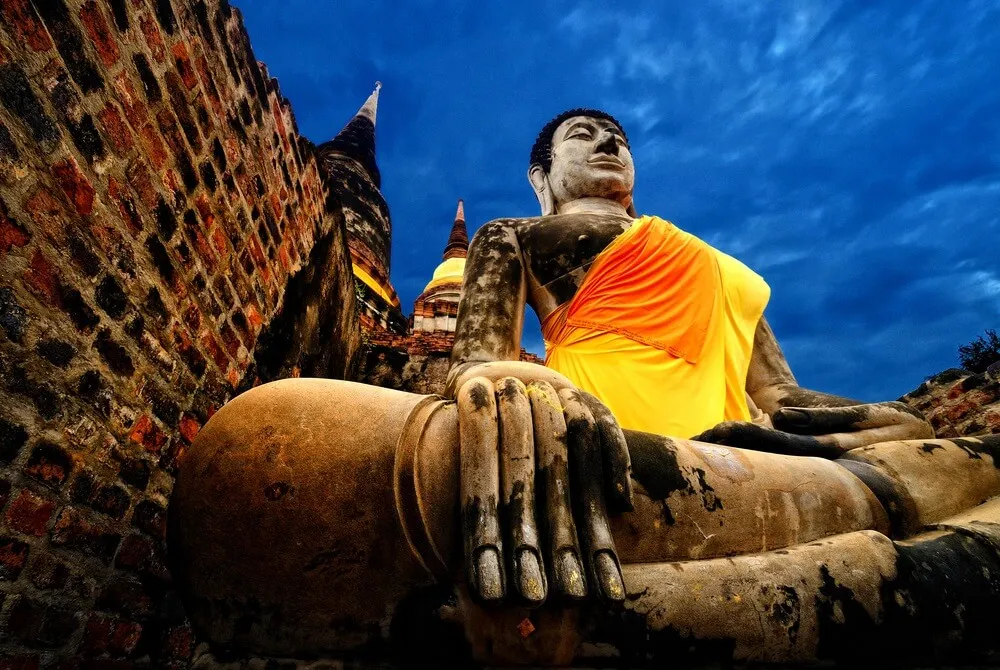The 12 Laws of Karma and Their Explanation

Although karma is often perceived as a single guideline, there are actually 12 laws of karma, based on which this principle is broken down. They refer to aspects such as change, humility, growth, and responsibility.
In general, the 12 laws of karma can serve as a roadmap for people to guide their way through certain aspects of life. In today’s article, we’ll take a detailed look at what they are.
What is karma?
Karma is an idea that’s closely linked to the concept of reincarnation or rebirth. Indeed, the better your karma, the better the life you will be able to enjoy after reincarnation.
This is a central concept in many Asian religions. It’s an active principle that governs almost all schools of Buddhism, Hinduism, Taoism, and Jainism.
Moreover, quite a few experts and researchers have associated karma with the law of universal causality. In this sense, it’s believed that your actions (causes) determine your future (effects).
However, this belief has gone beyond Asian borders and has become established in Western society. Today, more than a few people hold this belief as a guideline for their actions.
Like this article? You may also like to read: Spiritual Awakening: The 13 True Signs of Awakening
What are the 12 laws of karma?
First of all, it’s important to note that there is no single interpretation; thus, the explanations of the 12 laws of karma that we point out include many different principles from various belief systems.
1. The great law of karma
This is also known as the law of cause and effect. It’s the main reference that people have when they think about this concept, in part because it’s one of the most important pillars.
This principle dictates that every action, thought, or energy you gather will be returned to you, regardless of whether they’re good or bad. In short, you reap what you sow. This is true not only in the afterlife, but also in this one.
For example, if you want to find love, you must start by loving yourself. If you want peace in your life, you must be a peaceful person. Everything that’s given to you is a side effect of a cause that you have created. The other laws of karma follow from this one.
2. The law of creation
Contrary to popular belief, karma dictates that you’re the co-creator of your life, your destiny, and your future. Things don’t just come into your life; they come into your life because you’ve created different situations that have allowed them to come into your life.
Of course, one action isn’t enough to postpone a state. You must be constantly creating favorable and kind situations for yourself and others. Nothing happens by chance; it happens because you’ve mediated it through action.
It’s important to note that it’s not just about using your talents, skills, abilities, and strengths for your own benefit; it’s also about using them with others. This will also be discussed in more depth in other laws of karma later in this article.

3. The law of humility
The law of humility manifests itself in several ways in karma. The most important is the one that dictates that you must be humble in accepting that your present life is the consequence (or effect) of your past actions. If you don’t assimilate this principle, then karma will work against you.
This law is very important, as it invites you to assume responsibility and prevent it from falling on someone else. Your work, family, academic and social progress are nothing more than the result of your actions… whether you are happy with them or not.
If your family, work, or social life doesn’t correspond to what you expected, you must be humble to avoid attributing the problem to family, friends, or third parties. You are the only one responsible.
4. The law of growth
The law of growth dictates that everything begins and ends with yourself. You are the alpha and the omega of your own life, but also of everything around you. That is, to the extent that you wish to grow spiritually, this growth will also be transferred outwardly, not the other way around. This is a very important principle.
The morals, ethics, values, and stability of a region, therefore, relate to what its citizens have done internally to create it. Another interpretation of this precept teaches you that you can’t control the people or things around you. Since they’re also governed by this law, you truly won’t be able to do anything about them.
We think you may be interested in reading this, too: Micromeditation: What It Is, Its Benefits, and How to Practice It
5. The law of responsibility
This law teaches you that you must be responsible for everything that revolves around you. Your actions, your thoughts, and your life in general are your responsibility.
However, it’s not only that. You’re also responsible for what others think of you (they judge you by your actions), how they treat you, the consequences of your actions, and how you treat others.
In short, everything that includes you in one way or another is part of your responsibility. Therefore, you must assume the role you play with commitment.
6. The law of connection
Your whole life is linked by the same thread. Your past, present, and future – even if they seem disconnected from each other – are part of a single thread: life. Your past is related to the present, and this, in turn, to the future.
It’s all a continuous manifestation that depends closely on the previous one. You are what you are today because of your past actions, and tomorrow you will be what you will be because of the things you’re doing today. The law teaches you that the first step is as important as the last.
Another interpretation of this principle is that no action is disconnected, even when it comes from different subjects. To use an example we’ve already given, a region can only be peaceful when all its citizens practice peace.
7. The law of focus
This is also known in some contexts as the law of force. It indicates that to achieve transcendental results, you must avoid doing many things at the same time. If you do this, your mind will become clouded with principles such as anger or greed. Therefore, you should always face one thing at a time.
Both your energy and your concentration should be on a single point. This way, you achieve better results in what you set out to do. However, it’s not only that. The principle also dictates that you should not lose focus on the spiritual side. If you put it aside, your life will be derailed.
8. The law of generosity
Karma is as much about what you say as what you think. There must be a balance between what you think in your mind and what your hands do. It’s not enough to consider yourself a generous or hospitable person; you must actually go out in the world and be one.
For example, if you believe in helping the poor, protecting helpless children, and caring for and feeding the elderly, you must take actions in your life that are in line with all of these. It’s not enough to just approve of it in your mind.
In short, you must practice what you believe in and do it often – not once or twice, but repeatedly. Although thoughts condition your being, this has no repercussions on reality. You can only change what you dedicate time and action to. In short: be kind.
9. The law of the here and now
We’ve pointed out that the past, present, and future are all connected. However, you shouldn’t interpret this with your mind always on what happened or what will happen. It’s one thing to be aware of the law of connection and another to dwell on the actions you have done or the actions yet to come.
Your life consists of the here and now and nothing else. You can’t change the actions that you’ve already done. You can only control the actions you still have to do from today. The present, therefore, must be your meeting point.
Of course, you shouldn’t only apply this precept to yourself, but also to others. For example – and to connect this with the previous law – it’s not enough that you’ve been generous in the past or that you plan to be generous in the future. You must do generous actions today.
10. The law of change
If you have had to deal repeatedly with anything, it’s this law of karma put into action. In simple terms, this is the universe’s way of motivating you to learn a lesson. You will have to experience something over and over and over again until you truly learn from it.
For example, if you have only had toxic love relationships, been in a disastrous work environment, or dealt with unpleasant events repeatedly, it’s because you still haven’t learned your lesson completely. When you do, your life will change.
Of course, change is not a halo that magically descends from the sky and lights up your life. As you’ve learned with the other laws of karma, you must be the one to develop it through action. Meditate on what lessons you can learn from what has happened to you in order to adjust your actions, thoughts, and decisions.

11. The law of patience
This is also known as the law of patience and reward, since waiting with serenity often pays off in one way or another. To achieve great things requires time, dedication, and a lot of effort. Giving up halfway is definitely not an option.
The law of patience dictates that hard work pays off, especially when you do it with a set purpose. We’re not just talking about the work that rewards you, but also the work you do for others.
In fact, it’s the work you do selflessly that has the most value. Karma will always give you back what you give. If you truly believe in karma, you must begin to cultivate patience.
12. The law of importance
The last of the laws of karma is the law of importance. This is also known as the law of importance and inspiration. It proclaims the importance of individual contributions in the sum of a group whole. Your individual actions don’t go unnoticed, but add up to others that affect the world.
It doesn’t matter if it’s a large or small deed. The universe doesn’t remain indifferent to them. Moreover, your actions can also inspire others to do similar things. Thus, a larger contribution is made, creating a snowball effect.
The laws of karma are all connected
The 12 laws of karma, as you can see, aren’t disconnected from each other but are part of a single principle. They’re the pillar that supports this concept, so you can use them to lead your life on this path. Karma is like a boomerang that sooner or later comes back to you, so it’s impossible to ignore it.
All cited sources were thoroughly reviewed by our team to ensure their quality, reliability, currency, and validity. The bibliography of this article was considered reliable and of academic or scientific accuracy.
- Armstrong, J. Karma: The ancient science of cause and effect. Mandala Publishing. 2017.
- Reichenbach, B. R. The Laws of Karma and Causation. In The Law of Karma. Palgrave Macmillan, London. 1990; 24-43
- Reichenbach, B. R. The law of karma and the principle of causation. Philosophy East and West. 1998; 38(4): 399-410.
- Steiner, R. Las manifestaciones del Karma. Editorial Kier. 2007.
This text is provided for informational purposes only and does not replace consultation with a professional. If in doubt, consult your specialist.








